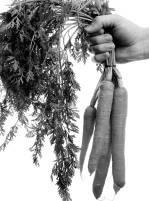home | metro santa cruz index | features | santa cruz | feature story

Home-grown: Do-it-yourself produce is Mother Earth's best value.
Much Ado About Something
Top 10 garden thoughts for the day
By Bill Van Diesel
1. Feed the soil, not the plants.
Soil microbes and worms need love too! Organic fertilizers and compost are good for all soil life, chemical plant foods (a salt made up of an acid and base) kill microbes and act like salt on a slug to the roots of plants.
2. Grow what you want to eat.
Having 40 pounds of quinoa is very cool, but it doesn't work as a salad for dinner, or as green beans for your favorite casserole. Think of your favorite things. Don't get too esoteric.
3. Water less frequently and more deeply.
Water deeply enough to wet the projected root zone of your main crop plant for that area. Top-splashing for five minutes draws the roots to the surface, reducing drought tolerance, and splashes fungal spores into the crown of the plant where they can do the most damage.
4. Start now!
Plant a few lettuce and carrot seeds in whatever space you have. Some potting soil (or borrowed soil from your friend's garden) plus a little Sustane 4-6-4 in an old bucket
is great. Don't overdo it and then get frustrated with the work or results. Learn
a little every day.
5. Exclusion is the best way to deal with pests.
Whether it's row cover or slug barriers, the easiest way to eat your own salad is to prevent others from getting to it. Judicious use of pest barriers can make all the difference, and maybe talk to the neighbor about their dogs. Gopher Baskets!
6. Healthy plants avoid problems.
Organics, compost and proper watering produce plants that shrug off problems
that are fatal for the plants across the way. Learn where a plant comes from: celery originated in swampy areas--it needs a lot of moisture in the soil; tomatoes are from drier, warmer soil and grow fungus in those conditions.
7. Mulch, Mulch, Mulch.
Many gardens are severely lacking in organic matter. The breakdown of organic matter into humic acid is a continuous process that needs to be refreshed every year. Compost all your own green waste so you know what is in there; avoid someone else's chemicals. Use your green waste container for Bermuda grass and diseased material.
8. Attract beneficial insects.
Plant some varieties specifically to attract and feed beneficials. They can also be purchased and released--a great way to jump your population, especially if you provide what they need to stay and prosper. And remember that a pest infestation is an opportunity to draw predators.
9. Plant perennial food crops.
Apples and asparagus produce each year with less input and time on your part. A lemon tree will produce magnificent fragrance and lemon for your fish or tabouli. Once again, think of what your family eats!
10. Get your kids involved.
A little work is good for them: "It builds character" (says my 11-year-old), they have younger knees and they're already closer to the ground. Read gardening books to them at bedtime, you never know how soon the ability to grow your own food may be critical.
Bill Van Dusen has farmed and studied all his life, has a degree in horticulture, was the 'Plant Dude' at General Feed and Seed for 13 years, works with Dave Allen Tree Service, Kathy's Lift truck and lighting service does an agricultural Q&A on KPIG's live show 'Please Stand By' and raises kids and sheep in his spare time. His seasonal ruminations will be featured regularly in these pages.
Send a letter to the editor about this story.
|
|
|
|
|
|